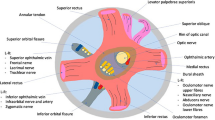Abstract
In order to achieve a better functional and clinical knowledge of a masticatory muscle called the sphenomandibularis that is suspected to be responsible for headaches by compressing the maxillary nerve, bilateral dissections of the infratemporal fossa were performed on ten human cadavers and completed by histological and radiological studies of the same areas. Both macroscopic and microscopic observations obviously showed that the so-called sphenomandibularis muscle corresponds to the deep portion of the temporalis muscle, since there is no epimysial septum between these two structures, which previously have been described as being completely independent from each other. In spite of the close topographic relationship between the deep belly of the temporalis and the lateral pterygoid muscle, as well as their similar innervation pattern, the sphenomandibularis in fact has to be considered functionally as an original but non-isolated positional fascicle of the temporalis muscle itself. Our observations, correlated with MR images, suggest indeed that the deep belly of the temporalis muscle is of functional importance in the masticatory movements, but is not involved by its neurovascular vicinity in the genesis of specific headaches. Its surgical release, however, should be discussed in the case of a temporal myoplasty.




Similar content being viewed by others
References
Dunn GF, Hack GD, Robinson WL, Koritzer RT (1996) Anatomical observation of a craniomandibular muscle originating from the skull base: the sphenomandibularis. Cranio 14: 97–103
Eisler P (1912) Die Muskeln des Stammes. In: von Bardeleben K (ed) Handbuch der Anatomie des Menschen, Bd 2/2/1. Gustav Fischer, Jena, pp 197–220
Gaspard M (1972) Les muscles masticateurs superficiels des singes à l’homme: anatomie comparée et anatomo-physiologie. Maloine, Paris, p 288
Gaspard M, Laison F, Lautrou A (1976) Le plan général d’organisation de la musculature masticatrice chez les mammifères. Actual Odonto-Stomatol 113:65–100
Gaudy JF, Zouaoui A, Bri P, Charrier JL, Laison F (2001) Functional anatomy of the human temporal muscle. Surg Radiol Anat 23:389–398
Gorniak GC (1986) Architecture of the masticatory apparatus in eastern raccoons (Procyon lotor lotor). Am J Anat 176:333–351
Groscurth P (1996) New muscle—old story? Nat Med 2:1162–1163
Henlé J (1871) Handbuch der systematischen Anatomie. Friederich Vieweg & Sohn, Braunschweig, pp 160, 171–173
Labbe D, Huault M (2000) Lengthening temporalis myoplasty and lip reanimation. Plast Reconstr Surg 105:1289–1297
Laison F, Lautrou A, Azerad J, Pollin B, Levy G (2001) Superficial architecture of the jaw-closing muscles of the cat ( Felis catus): the temporo-masseteric complex. C R Acad Sci Paris, Sciences de la vie/Life Sci 324:855–862
Lang J (1981) Klinische anatomie des Kopfes. Springer, Berlin Heidelberg New York, p 104
Legent F, Laccourreye H (1991) La fosse infratemporale. Arnette, Paris
Lubosch W (1938) Muskeln des Kopfes. Bolk L, Göppert E, Kallius E, Lubosch W (eds) Handbuch der vergleichenden Anatomie der Wirbeltiere, Bd 5. Urban & Schwarzenberg, Berlin Wien, pp 1065–1077
Paturet G (1951) Traité d’anatomie humaine (tome 1). Masson, Paris, pp 660–661
Picqué R (1913) Signification morphologique du feuillet profond de l’aponévrose temporale chez l’homme. Bull Mem Soc Anthropol, 4éme série, tome IV. Paris, pp 104–108
Poirier P, Charpy A (1899) Traité d’anatomie humaine. Masson, Paris, pp 369–372
Poirier P, Charpy A, Cunéo B (1908) Abrégé d’anatomie, tome 1. Masson, Paris, p 141
Ramalho LRT, Landucci C, Porciúncula HF (1978) Estudo macro e mesoscopico do feixe profundo do músculo temporal humano. Rev Fac Odont Araraquara 1:105–110
Rouvière H (1920) Sur les insertions des muscles temporal et masséter chez l’homme. Bull Mém Soc Anat, 6éme série, tome XVI. Paris, pp 312–314
Rouvière H (1954) Anatomie humaine descriptive et topographique, tome 1. Masson, Paris, p 133
Sakamoto Y, Akita K (2004) Spatial relationships between masticatory muscles and their innervating nerves in man with special reference to the medial pterygoid muscle and its accessory muscle bundle. Surg Radiol Anat 26:122–127
Schmidt HM (1994) Kopf und Hals. In: Benninghoff Anatomie, vol. 1. Urban & Schwarzenberg, Munich, p 509
Schon Ybarra MA, Bauer B (2001) Medial portion of M. temporalis and its potential involvement in facial pain. Clin Anat 14:25–30
Schumacher GH (1961) Funktionelle Morphologie der Kaumuskulatur. Gustav Fischer, Jena, pp 18–23
Shankland WE (1995) Craniofacial pain syndromes that mimic temporomandibular joint disorders. Ann Acad Med Singapore 24:83–112
Shankland WE, Negulesco JA, O’brian B (1996) The “pre-anterior belly” of the temporalis muscle: a preliminary study of a newly described muscle. Cranio 14:106–112
Shimokawa T, Akita K, Soma K, Sato T (1998) Innervation analysis of the small muscle bundles attached to the temporalis: truly new muscles or merely derivatives of the temporalis? Surg Radiol Anat 20:329–334
Testut L (1905) Traité d’anatomie humaine, 3éme édn. Octave Doin, Paris, pp 707–709
Turp JC, Cowley T, Stohler CS (1997) Media hype: musculus sphenomandibularis. Acta Anat 158:150–154
Williams PL, Bannister LH, Berry MM, Collins P, Dyson M, Dussek JE, Ferguson MWJ (1995) Embryology and development. Masticatory muscles. In: Gray’s anatomy, 38th edn. Churchill Livingstone, London, pp 277–84, 800–801
Yoshikawa T, Suzuki T (1962) The lamination of the human masseter—the new identification of M. temporalis superficialis, M. maxillomandibularis in the human anatomy. Acta Anat Nippon 37:260–267
Zenker W (1955) Ueber einige neue Befunde am M. temporalis des Menschen. Z Anat Entwicklungsgesch 118:355–368
Zenker W, Zenker A (1956) Zur funktionellen Anatomie des M. temporalis. Dtsch Zahn Mund Kieferheilkd 24:368–375
Author information
Authors and Affiliations
Corresponding author
Rights and permissions
About this article
Cite this article
Geers, C., Nyssen-Behets, C., Cosnard, G. et al. The deep belly of the temporalis muscle: an anatomical, histological and MRI study. Surg Radiol Anat 27, 184–191 (2005). https://doi.org/10.1007/s00276-004-0306-3
Received:
Accepted:
Published:
Issue Date:
DOI: https://doi.org/10.1007/s00276-004-0306-3




